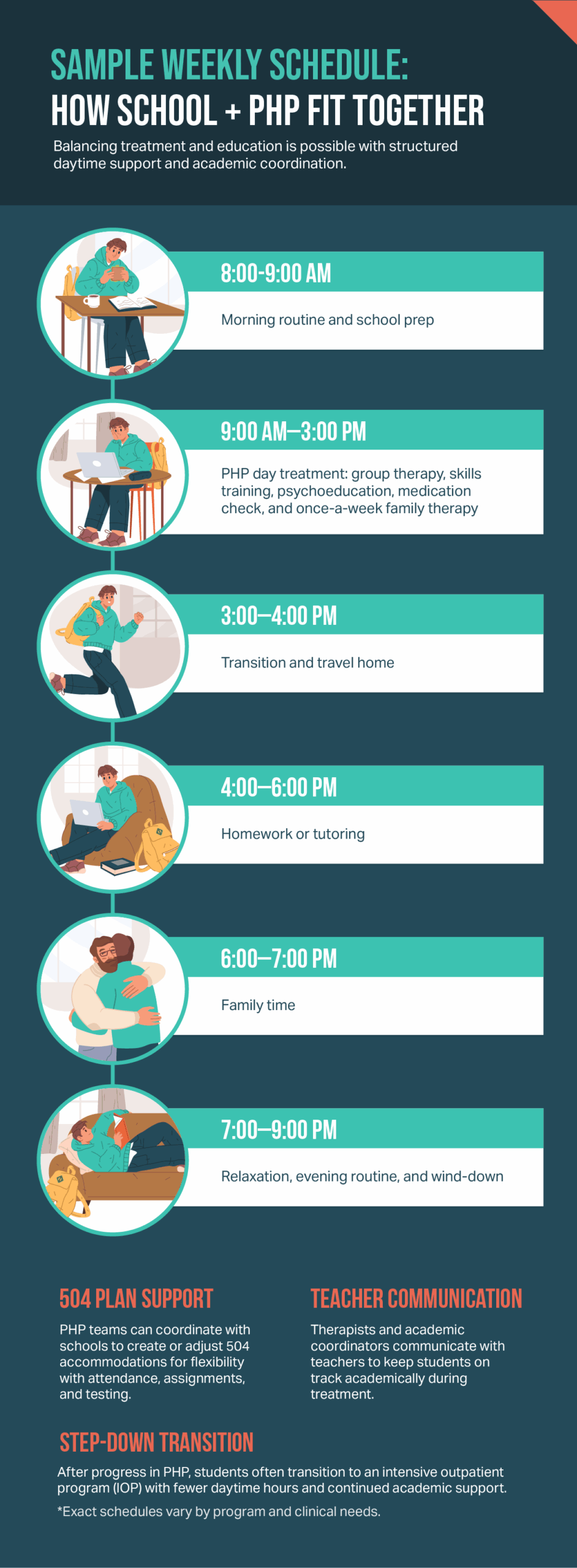Parents often worry that a teen will fall behind in school when starting a partial hospitalization program. Fortunately, Boise area schools and local providers regularly coordinate to help students keep up with classes while they receive intensive treatment. This guide explains how school accommodations work, what families can expect, and how to set up a smooth plan for your child. If you are exploring options in Ada County, Zelus Recovery supports teens through our partial hospitalization and intensive outpatient programs.
What are partial hospitalization programs (PHPs)?
A partial hospitalization program is a structured, daytime level of care for mental health and/or substance use. It is sometimes a bridge between inpatient or residential care and a standard outpatient program. Teens attend therapy and treatment sessions during the day, then return home in the evening. Many PHPs include individual therapy, group therapy, family therapy, and medication management when needed. Teens learn healthier coping skills with cognitive behavioral therapy (CBT), dialectical behavior therapy (DBT), and mindfulness practices.
PHP is considerably more intensive than traditional outpatient treatment and often runs several hours per day, several days per week. These programs help patients stabilize symptoms, build problem-solving skills, and prepare for a step down to an intensive outpatient program (IOP).
Recovery doesn’t mean falling behind: it means rebuilding routines that make learning possible again.
How PHP impacts school attendance and credits
PHPs are designed to protect your child’s education while effectively addressing mental health. Here is what families can expect:
- Attendance, documented and excused: Boise schools generally code missed days as medical absences when a licensed medical or mental health provider verifies treatment. In the Boise School District, medically documented absences generally do not count toward the semester absence limit.
- Credits, protected with a plan: When a student cannot be in class during the school day, counselors help set a plan to keep coursework on track. Many teens use online modules, teacher-provided packets, or short-term credit recovery later in the term. Idaho Digital Learning Alliance is one option districts may use for credit recovery.
- Transition, then step down: As symptoms improve, a treatment plan often shifts to an intensive outpatient program. That change frees more time for on-campus learning while keeping clinical support. A PHP team will communicate the transition timeline so teachers can update expectations.
Understanding Boise School District policies
Rules can vary by campus, but district pages show consistent practices families can use.
- Excusing absences: Parents report absences daily, then provide medical documentation for treatment days. Ask your school how to submit documentation.
- Pre-arranged absences: If your child will miss 3 or more days in a row, most secondary schools offer a pre-arranged absence form to gather assignments in advance.
- Homebound versus home-based services: The district offers homebound support in limited medical situations and home-based services through an Individualized Education Program. These options are different from PHP. If your teen is completing a residential program or recovering from a hospital stay, a counselor can explain whether temporary homebound instruction applies.
Policies are updated as needed, so maintain contact with your school’s attendance office for the latest steps.
504 plans, IEPs, and special education supports during PHP
Many teens in PHP already have a 504 plan or an IEP, and others qualify during treatment. Under federal law, Section 504 protects students with physical or mental health disorders that substantially limit major life activities. Schools must provide a free appropriate public education with reasonable accommodations.
Common supports during a partial hospitalization program include:
- Adjusted deadlines, reduced workload, or alternate assignments during intensive treatment weeks.
- Class notes, recorded lessons, or access to online platforms while the child attends treatment sessions.
- Testing accommodations, such as extended time, quiet settings, or make-up windows.
- Attendance flexibility: for example, late arrival or early release to attend care.
- Counseling check-ins to monitor progress and safety.
If your child has an IEP, the special education team can add short-term goals that address anxiety, depression, or other needs that affect learning. The treatment facility can share recommendations when you sign a release of information (ROI) form.
Coordinating between schools and PHP providers
Good coordination lowers stress for teens and families. Here’s what that looks like:
- Consent and privacy: Parents sign releases so the PHP team can speak with the school counselor, the IEP case manager, or the 504 coordinator. Without consent, providers cannot share details.
- A single point of contact: Pick one school staff member, often the counselor, as the hub for communication. They collect teacher questions and send one response back after checking with the clinical team.
- A clear treatment plan: The PHP team outlines treatment sessions, goals, and a rough week-by-week schedule. This helps teachers plan due dates, labs, and exams.
- Regular updates: Short updates every 1 to 2 weeks keep everyone aligned on progress. When the teen is ready to step down to an intensive outpatient program, the school can adjust accommodations.
If you want a program that works closely with Boise schools, explore our adolescent treatment center in Boise to see how family therapy and school coordination fit into care.
Steps parents can take to help teens balance school and recovery
Planning ahead and staying organized can make a big difference.
- Build the week-by-week schedule. Write down PHP hours, transportation, and homework blocks. Mark labs or tests that may need make-up dates.
- Request a school meeting. Ask for a 504 or IEP meeting if your child needs formal accommodations. Bring documentation from the partial hospitalization program .
- Organize assignments. Help your teen list tasks by class, then focus on the next small step to stay on track and reduce overwhelm.
- Protect sleep and nutrition. Stable routines and a supportive environment at home help teens manage anxiety and return to class more smoothly.
- Plan the step down. When your child is completing PHP, ask the team to walk you through the plan for transitioning to the next level of outpatient care.

Common questions from Boise families
Will my teen fall behind on credits in PHP?
Most patients stay on track with a written plan. Counselors organize make-up work, online modules, or short credit recovery if needed. If a class is at risk, the team can determine whether an extension or an adjusted assignment fits your child’s specific needs. Many adolescents complete PHP and finish the semester at the same level as peers.
How do Boise schools handle absences for mental health treatment?
Parents report absences and provide medical verification from the treatment provider. Schools often code those days as medical, which do not count toward the limit, based on district practice. Check your campus attendance guidelines and ask how to submit documentation.
Can my child keep their IEP or 504 while in PHP?
Yes. A 504 plan or IEP continues during treatment. Teams can add temporary accommodations, then revisit them when the teen transitions to an intensive outpatient program or returns fully to campus. Section 504 requires schools to make accommodations such as flexible deadlines and testing supports.
Who communicates with the school, me or the treatment program?
Both, with your consent. Parents sign a release so the program can share attendance, safety, and progress updates. Find one school contact (usually the counselor) to streamline the process.
Outpatient program levels
There are three generally recognized levels of outpatient care:
- Partial hospitalization program: Daytime care with individual therapy, group therapy, family therapy, and medication management. Teens return home each evening to maintain connection with family life.
- Intensive outpatient program (IOP): Several sessions per week after school; a strong fit for transition after PHP or for who teens who need a less intensive program to start with.
- Traditional outpatient treatment: Weekly therapy and psychiatry visits (if applicable), useful for maintenance when IOP ends.
An inpatient or residential program can provide a safe and secure environment when risk is high, then coordinate a return-to-learn plan and step down to PHP when appropriate.
Zelus can coordinate with your teen’s school
Balancing school and PHP in Boise
School accommodations during PHP in Boise work best when parents, schools, and providers share a plan. A partial hospitalization program gives adolescents intensive treatment while protecting credits and classroom progress. If your child is struggling with anxiety, depression, or substance use, our team can assist with assessment, identify the right level of care, and coordinate with their school. We will help determine next steps, address insurance questions, and support your family through the transition to recovery.





